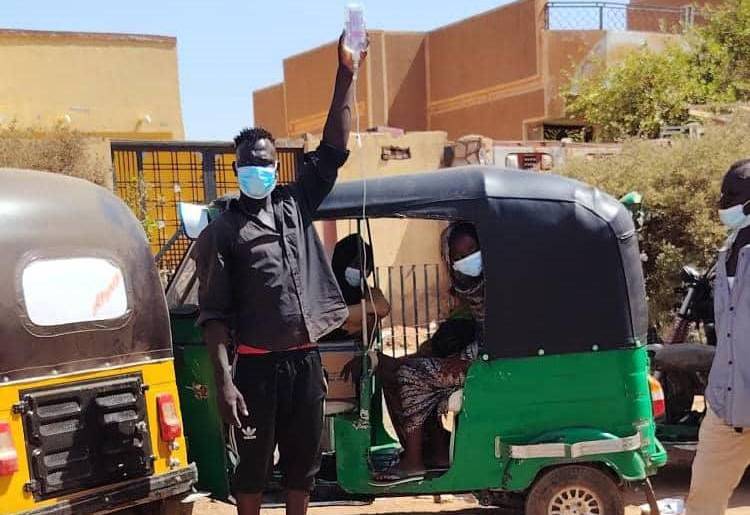
Omdurman: Cholera Ravages the City Amid Escalating Health Crisis
Sudan Media Forum
Omdurman, May 31, 2025 (Sudan Tribune) – Nour Eldin is living in a state of despair as he struggles to save his family after his wife and two daughters contracted cholera in Omdurman, west of the Sudanese capital, which has become a major hotspot for the outbreak across the country.
Nour Eldin (50), who recently recovered from cholera himself, expressed frustration over the level of medical care at Al-Nau Public Hospital in central Omdurman. He is still covering the high costs of treatment for his family, forced to buy intravenous fluids at exorbitant prices from the black market. The situation worsened after the Federal Ministry of Health decided to shut down the isolation center at Al-Nau Hospital on Wednesday evening, following the spread of the disease around the hospital and the sharp rise in cases in the area.
What is Cholera?
Cholera is an acute bacterial infection caused by ingesting food or water contaminated with Vibrio cholerae bacteria. The disease is characterized by sudden onset of profuse watery diarrhea, which can quickly lead to severe dehydration and shock. Without prompt treatment, cholera can be fatal within hours. Symptoms include profuse watery diarrhea (often described as resembling rice water), vomiting, and leg cramps.
Prevention of cholera relies primarily on ensuring access to safe drinking water, proper sanitation, personal hygiene, and vaccination in endemic areas.
According to a recent press release by the United Nations Childrens Fund (UNICEF), “Cholera cases in Khartoum have surged from 90 cases per day to 815 cases per day between May 15 and May 25—a ninefold increase in just ten days.”
Deteriorating Medical Services
Hafiz Nour Eldin (possibly a different person from the first-mentioned Nour Eldin, or clarification needed) and his wife and two daughters contracted cholera less than a week ago in Omdurman. Speaking to Sudan Tribune, Nour Eldin described the severe difficulties he faced in securing treatment for his family. He confirmed that while they received initial care at Al-Nau Hospital, he continues to struggle to meet their other medical needs. He described the current situation as "critical," despite the efforts of doctors and volunteers at the hospital, which is receiving a growing number of patients every day.
Closure of the Isolation Center
Sources told Sudan Tribune that the Federal Ministry of Health closed the isolation center at Al-Nau Hospital on Wednesday evening due to the spread of the disease in its vicinity and the rising number of cases in the area.
The sources reported that officials from the Federal and State Ministries of Health visited Al-Nau Hospital over the past two days and decided to close the isolation center after cholera cases in the area exceeded 500, with more than 100 deaths.
Cholera patients from Al-Nau Hospital’s isolation center have been transferred to several other hospitals, including Bashair, Alban Jadeed, Umbada Model, Omdurman Teaching, Al-Ameen Hamed, Al-Turki, and Al-Saudi Hospitals.
New Cases and Widening Spread
Fatima Ahmed, a resident of the Al-Gaili area north of Khartoum, reported that four members of her family have been infected with cholera. They have been receiving treatment at the isolation center in Umbada Model Hospital for the past two days. Speaking to Sudan Tribune, Fatima expressed her fears of the disease spreading among residents, especially given the absence of medical services in the area. Suspected cases have also emerged in the Halfaya area, according to sources speaking to Sudan Tribune, due to the use of contaminated water and deteriorating environmental conditions.
Rising Cases and Deaths
Meanwhile, the Humanitarian Affairs Sector of the Forces of Freedom and Change (FFC - Taqaddum) revealed that cholera cases have risen to 8,000, with 200 deaths recorded in the past three days.
The sectors statement highlighted the detection of eight cholera cases, including one death, in South Darfur State—an alarming development that raises the risk of the disease spreading to wider areas in Darfur. These regions host large populations of internally displaced persons (IDPs) and refugees, living in dire health conditions and severely impacted by the ongoing war. The Humanitarian Sector has called for an urgent response plan to contain the outbreak.
It also urged government authorities to declare a public health emergency, particularly in Khartoum State, which it described as a "disaster zone" due to the shortage of medical supplies, the sharp rise in deaths, the difficulty in controlling the spread of the disease, and the compounded impact of war and the destruction of service infrastructure.
Case Surge Following Military Developments in Khartoum
Federal Health Minister Dr. Haitham Mohamed Ibrahim revealed that cholera cases in Khartoum State have surged to 1,000 cases per day, with a case fatality rate between 2% and 3%.
In an exclusive statement to Sudan Tribune, the minister said:
"There has been an increase in cholera infections after the liberation of the Salha area and the announcement that Khartoum is free of Rapid Support Forces, with large numbers of people returning to their homes. The average daily cases have risen to 1,000, and the death rate is between 2% and 3%."
He added that most deaths occur before patients reach isolation and treatment centers or at later stages of the disease, highlighting a problem with immediate rehydration and adequate fluid intake at the onset of symptoms. "Our goal is to reduce the case fatality rate to below 1% in the coming days," he said.
Urgent Interventions by the Ministry of Health
The minister noted a slight decline in the epidemic curve over the past two days due to urgent interventions. He confirmed the provision of medical supplies, including over 100,000 IV fluid bags (drips) and other treatment protocol medicines. The World Health Organization has supplied 15 tons of medications, while UNICEF has provided chlorine supplies for water purification.
He also mentioned the opening of over 10 isolation centers with a combined bed capacity of more than 800 beds, with several organizations operating these centers. Additionally, he announced the receipt of 2.9 million doses of cholera vaccines designated for the most affected localities in Khartoum.
The minister stated that a number of cholera cases have been detected in other states, mostly imported from Khartoum, and that efforts are ongoing to fully contain them and prevent the spread of the disease to the rest of the country.
It is worth noting that the new wave of cholera spread in Omdurman, Khartoum State, after residents resorted to using unsafe water sources. This was a result of water station shutdowns following drone attacks by Rapid Support Forces on power stations, cutting off electricity to these vital facilities.
The Sudan Media Forum and its member organizations publish this report, prepared by Sudan Tribune, to shed light on the challenges faced by civilians in Khartoum State in their battle against disease outbreaks amid the total collapse of healthcare services and the absence of essential medicines.


